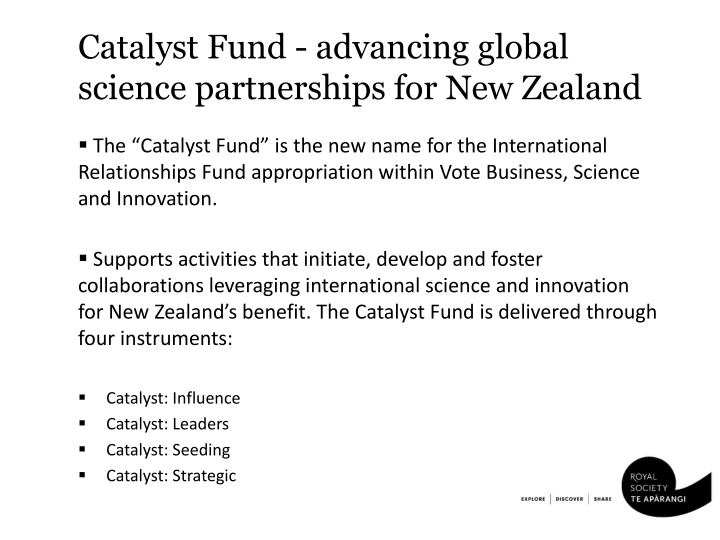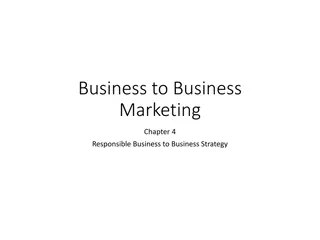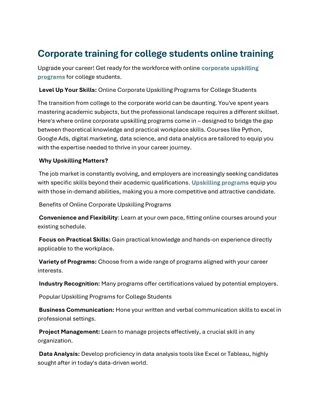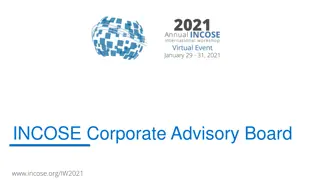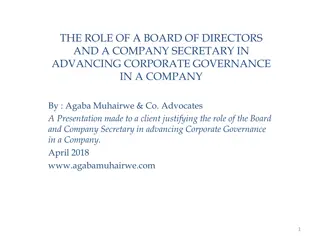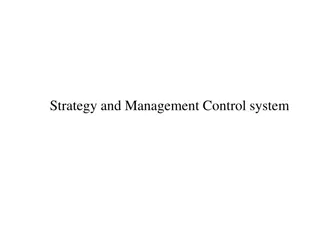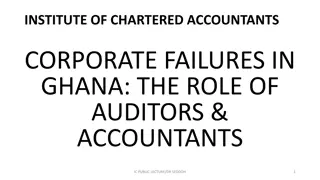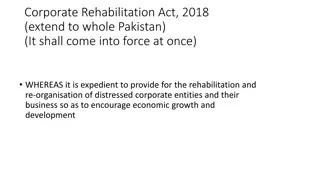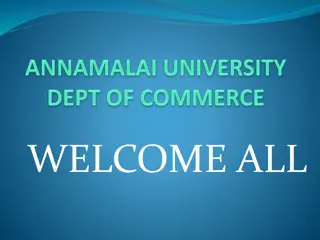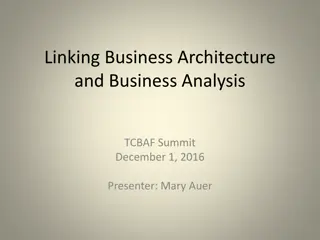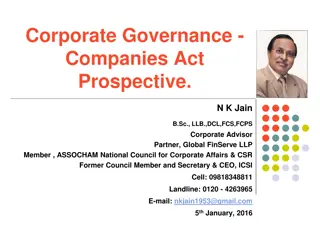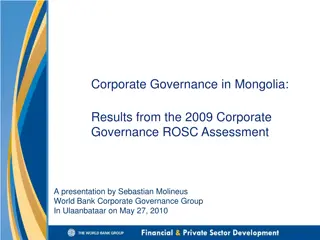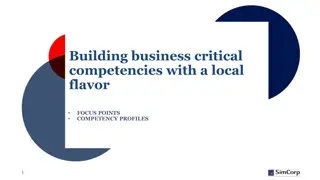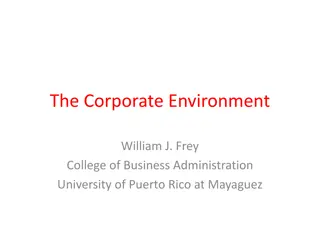Business vs Corporate Strategy: Key Differences Explained
The disparities between business and corporate level strategies and understand their definitions and implications in achieving organizational goals. Learn about cost leadership, differentiation, expansion, retrenchment, diversification, and more.
Download Presentation

Please find below an Image/Link to download the presentation.
The content on the website is provided AS IS for your information and personal use only. It may not be sold, licensed, or shared on other websites without obtaining consent from the author.If you encounter any issues during the download, it is possible that the publisher has removed the file from their server.
You are allowed to download the files provided on this website for personal or commercial use, subject to the condition that they are used lawfully. All files are the property of their respective owners.
The content on the website is provided AS IS for your information and personal use only. It may not be sold, licensed, or shared on other websites without obtaining consent from the author.
E N D
Presentation Transcript
Catalyst Fund - advancing global science partnerships for New Zealand The Catalyst Fund is the new name for the International Relationships Fund appropriation within Vote Business, Science and Innovation. Supports activities that initiate, develop and foster collaborations leveraging international science and innovation for New Zealand s benefit. The Catalyst Fund is delivered through four instruments: Catalyst: Influence Catalyst: Leaders Catalyst: Seeding Catalyst: Strategic
Catalyst: Seeding Facilitates new small and medium pre-research strategic partnerships that cannot be supported through other means, and with a view to developing full collaborations that could be supported through Catalyst: Strategic over time. Three annual calls Call JANUARY Open Date 30 January 2020 Close Date 23 April 2020 Programmes General General New Technology Programme APRIL 30 April 2020 16 July 2020 Zealand - Germany Science & General New Zealand Japan Joint Research Programme Dumont d Urville NZ-France Science & Technology Support Programme JULY 30 July 2020 (TBC) 15 October 2020 (TBC)
Catalyst: Seeding General Background Supports new small and medium pre-research strategic partnerships that cannot be supported through other means, and with a view to developing full collaborations that could be supported through Catalyst: Strategic Fund. Objective To enhance knowledge creation in New Zealand by linking with world-class international research groups, infrastructure and initiatives, To create enduring international science partnerships for New Zealand by providing multiple scale pre-research collaboration and a line of sight through to Catalyst: Strategic. International Partner and Field of Research open to collaborations with researchers from any country within all fields of research, science and technology. Funding A maximum of NZ$80,000 (GST Exclusive) in total is available per Proposal for projects lasting up to two years. Allowable expenses: Travel, research expenses, expenses related to hosting workshops
Catalyst: Seeding bilateral programmes New Zealand Japan Joint Research Projects - Max funding $60,000 per proposal for up to two years - Funding up to NZ$180,000 has been allocated to support New Zealand Japan Joint Research Projects Dumont d Urville New Zealand-France Science and Technology Support Programme - Max funding NZ$80,000 per proposal for up to two years. - Funding up to NZ$160,000 has been allocated to support the Dumont d Urville Science and Technology Programme New Zealand-Germany Science & Technology Programme - Max funding NZ$80,000 per proposal for up to two years. - Funding up to NZ$240,000 has been allocated to support the programme - Field of Research must be related to Climate Change (physical processes, social-economic dimension and adaptation - TBC)
Catalyst: Seeding Programme Partner Application(s) Required Allowable expenses NZ$ Funding (GST exclusive) General International New Zealand Travel, research expenses, expenses related to hosting workshops Up to $80,000 in total for up to two years Sub-Programme New Zealand Germany Science & Technology Programme Germany New Zealand and Germany Travel, research expenses, expenses related to hosting workshops Up to $80,000 in total for up to two years Dumont d Urville NZ-France Science & Technology Support Programme France New Zealand and France Travel, research expenses, expenses related to hosting workshops Up to $80,000 in total for up to two years New Zealand Japan Joint Research Projects Japan New Zealand and Japan Travel, research expenses, expenses related to hosting meetings Up to $60,000 in total for up two years
Catalyst Seeding assessment criteria Criterion 1: Enduring collaboration (weight in assessment 30%) Track record of the New Zealand PI and Collaboration Partner (relative to opportunity) Clearly demonstrated excellence of the Partner Institution(s) Potential of the collaboration to create an enduring partnership. Ability of the Project Team to deliver on proposed activities. Criterion 2: Novel knowledge and partnership (weight in assessment 40%) How the Collaboration Partner will bring world-leading knowledge that complements the New Zealand Project Team members skills and knowledge. How the proposed collaboration will support a new partnership or a new research focus for an established collaboration. Criterion 3: Strategic benefits (weight in assessment 30%) Ability to leverage international investment, facilities and infrastructure not available in New Zealand. Clearly demonstrated pathway to build a substantive collaboration beyond an initial engagement that is in line with New Zealand s science priorities. Ability of Project Team to use the partnership to initiate links with relevant New Zealand research capabilities beyond the participating institutions.
Criteria 3: Criterion 3: Strategic benefits Contineud Clearly demonstrated pathway to build a substantive collaboration beyond an initial engagement that is in line with New Zealand s science priorities. New Zealand science priority may refer to high priority research fields as evidenced by links to a CoRE, NSC, biodiversity documents, local government priorities, or any other science priority argued in the proposal.
Catalyst: Leaders Supports incoming and outgoing targeted international fellowships for exceptional individuals that cannot be supported through other means Three annual calls Call JANUARY Open Date 30 January 2020 Close Date 23 April 2020 Sub-programmes International Leader Fellowships New Zealand - China Scientist Exchange Programme JSPS Postdoctoral Fellowships Julius von Haast Fellowship APRIL 30 April 2020 16 July 2020 HOPE Meeting (TBC) JULY 30 July 2020 (TBC) 15 October 2020 (TBC)
Catalyst: Leaders Sub- Programme International Leader Fellowships Brief Description Durati on 1 to 3 years NZ$ Funding (excl. GST) Per annum: $20,000 Stipend $20,000 Research $10,000 Host admin Awards Supports exceptional individuals from any country outside New Zealand to catalyse science and innovation capability and capacity in New Zealand for a minimum of 4 weeks per year for up to 3 years Up to 3 Julius von Haast Fellowship Award Supports an internationally recognised researcher from Germany to undertake research in New Zealand for a minimum of 4 weeks per year 3 years Per annum: $20,000 Stipend $20,000 Research $10,000 Host admin Up to 1 NZ-China Scientist Exchange Programme JSPS HOPE Meeting Supports the development of research linkages with China by enabling New Zealand researchers to visit Chinese research organisations Supports excellent PhD students and/or young researchers to attend the HOPE meetings with Nobel Laureates in Japan 4 weeks Flights and daily living allowance Up to 10 5 days Flights, accommodation, and meeting registration Up to 5 JSPS Postdoctoral Fellowship* Supports young and excellent New Zealand postdoctoral researchers doing research in Japan 12 24 months Flights, insurance and living allowance Up to 5
International Leader Fellowship Background The Programme enables a Fellow to catalyse science and innovation capability and capacity development in New Zealand for a minimum of four weeks per year for up to three years. Objective To support the attraction by New Zealand Research Organisations (the Hosts) of international fellows who can have a catalytic impact on New Zealand science capabilities and promote the importance of international cooperation in science. International Partner and Field of Research open to researchers from all countries and all fields of research, science and technology. Funding (per annum for up to three years) NZ$20,000 maximum stipend paid to the Leader via the New Zealand Host; NZ$20,000 maximum research and travel allowance paid to the Host; and; NZ$10,000 maximum host institution administration allowance paid to the Host.
New Zealand New Zealand- -China Scientist Exchange Programme China Scientist Exchange Programme Objective Objective Encourage and facilitate greater understanding and development of research linkages between the two countries in jointly agreed priority research fields for collaboration. Activity Description Activity Description Enable up to 10 up to 10 excellent New Zealand researchers to travel to mainland China and collaborate with researchers in mainland Chinese institutes for a four The New Zealand researchers can visit more than one Chinese research institute as part of the exchange. four- -week period week period (2-6 weeks) Beijing Orientation Beijing Orientation Exchange is expected to start with orientation ceremony in Beijing on 20 October. Funding Funding Travel, accommodation and daily allowance (no funds for research costs). Traveler is is responsible for their own visa application, travel and medical insurance Fields of Research Fields of Research Preference will be given to those applications under the listed priority research fields: Water Research Food Safety and Security Non-communicable disease.
Catalyst Fund - advancing global science partnerships for New Zealand How to apply: Applications must be submitted through Catalyst Fund Application Portal Contact your Research Office for log-in details Current open call (January) closes on Thursday 23 April, 2020
Human Frontier Science Program Aim of the Program is to promote, through international cooperation, basic research focused on the elucidation of the sophisticated and complex mechanisms of living organisms for the benefit of humankind. New Zealand is a member country. HFSP Research Grants support innovative basic research into fundamental biological problems with emphasis placed on novel and interdisciplinary approaches that involve scientific exchanges across national and disciplinary boundaries Projects should challenge existing paradigms by using novel approaches and techniques. Applications for high-risk/high-reward projects are particularly encouraged
Human Frontier Science Program Research grants are provided for teams of scientists from different countries who wish to combine their expertise in innovative approaches to questions that could not be answered by individual laboratories. Preliminary results are not required and applicants are expected to develop new lines of research through the research collaboration. Types of awards Program and Emerging Investigator Grants Long-term and Cross-Disciplinary Postdoctoral Fellowships Value and duration of awards Research Grants Maximum US$450,000 p.a. - 3 years for teams of 4 members Fellowships - living allowance as well as a research and travel allowance, 3 years Timetable Research Grants 2 stage process, Letter of Intent closes 30 March (register before 19 March) Fellowships applications close in August
Address fundamental life science questions with collaborations from from disciplines outside the traditional life sciences such as biophysics, chemistry, computational biology, computer science, engineering, mathematics, nanoscience or physics Truly interdisciplinary project can only succeed because of the interdisciplinary collaboration International/Intercontinental Not continuation of current research Projects are expected to be at the frontiers of knowledge and therefore entail risk Projects should challenge existing paradigms by using novel approaches and techniques. Applications for high-risk/high-reward projects are particularly encouraged Applicants are expected to develop new lines of research through the collaboration https://www.hfsp.org/
HFSPO funds basic life science research. HFSPO does not fund the following: 1. Projects of a purely applied nature. For example: projects of a primarily clinical and pharmaceutical nature are only considered if they allow new insights into fundamental biological mechanisms of disease; projects aimed at developing methods of diagnosis or treatment, including the search for potential drug targets or advanced trials of drugs under development; applied research in engineering, biotechnology, or nanotechnology, that does not address a fundamental biological problem; projects directly concerned with agricultural problems such as crop yield or breeding and environmental problems such as pollution. 2. Research aimed at developing novel methods or the study of analogs or models of biological activity unless these methods allow new biological questions to be answered in the context of the aim of the HFSP to fund fundamental research. 3. Observational projects or systematic screening approaches. 4. Large-scale data collection as such, unless there is a convincing rationale for the collection and detailed methodology for the data analysis; this includes the systematic multi-species-omic analyses of populations or ecosystems, which do not address a fundamental biological question of general interest. However, studies of the mechanisms of species-species interactions or their co-evolution are eligible. 5. Research in for-profit environments (but collaborations are allowed).
Expression of Interest for Catalyst Reviewers: To be considered for January Call, EOIs must be received 3 weeks before call closing date For more information: https://royalsociety.org.nz/what-we-do/funds-and- opportunities/catalyst-fund/reviewing-proposals/
For more information Troels Petersen Programme Manager - Research Fellowships & International (04) 470 5764 Catalyst Fund (RSNZ) Email:International.Applications@royalsociety.org.nz Website: https://royalsociety.org.nz/what-we-do/funds-and- opportunities/catalyst-fund/
